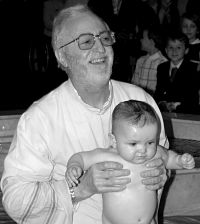Fr Alan James Fudge RIP - tribute and film

Fr Alan Fudge after Baptism
The Requiem Mass for Father Alan Fudge, parish priest at Ogle Street, central London will take place tomorrow morning ( Friday) at Westminster Cathedral at 11.30am. The chief celebrant will be Archbishop Vincent Nichols.
The burial will be in Saint Mary's cemetery at Kensal Green. After the Mass, and after the burial, there will be an Agape in the parish hall of Holy Apostles in Pimlico. A note on the Ogle Street parish website says: 'An Agape is more than some refreshments - it is an extension of the liturgy. We enjoy a communion with each other that only God can create.'
Today, (Thursday, 1 September 2011) everyone is also welcome to Ogle Street for the reception of the body at 2pm and for the for the Liturgy of the Word at 8pm.
Tribute by Vincent Harrington
Alan James Fudge was born in Bristol on 31 December 1940 during an air raid attack. He was the only son of Jim Fudge, himself an only child, and of Phyllis Dibble, one of a large and bustling family of ten children. They were married on Boxing Day 1939. Jim was not a Catholic and Alan did not attend a Catholic school. In his early teens he was taken by a friend to the Jesuit Church of St Mary on the Quay where his maternal grandmother lived. He developed a great love for the parish, the liturgy and the Jesuit priests there, becoming an altar boy and he soon began to display his talent for music on the organ. It was there, at the age of 15, that Alan made his first Holy Communion.
His vocation developed steadily from about this time. His first thought was to become a Jesuit lay brother in order to live a life of prayer, a gift which he certainly received. The priests at St Mary helped him to discover his calling to the priesthood, though not as a Jesuit. He retained a lifelong affection and gratitude towards the Jesuits and a great love for St Ignatius.
After working for a time in the offices of a paper manufacturing company, in 1961, he left employment and went to the Jesuit house of studies at Osterley to continue his education. While there, he became attracted to the missions and joined the White Fathers, an order dedicated to the mission in Africa. He studied with them at Blacklion in Ireland and at Totteridge in North London and received the habit on 8 September 1965. The international make up of his fellow students who came from so many different parts of the globe he always considered a great blessing in his formation, as indeed was the excitement of the Second Vatican Council taking placing during his seminary years.
However, it transpired that the White Fathers was not to be the path for Alan and, after further studies at the diocesan Seminary at Ware, he was ordained deacon on 29 June 1970 for the Diocese of Westminster and served in the parish of St Thomas of Canterbury, at Fulham in London. Meanwhile his father had undergone instruction in the faith, and to Alan's great joy, Jim Fudge was received into the Catholic Church.
Alan was ordained priest on 10 July 1971, a swelteringly hot summer's day, by Bishop Victor Guazzelli, at St Mary on the Quay. His first appointment was to the parish of Our Lady of the Rosary, Marylebone, where he was also chaplain to St Mary's Hospital in Paddington, a ministry which kept him extremely busy and which he grew to love greatly. There he revealed a talent for preaching firmly based on his own love of scripture and his familiarity with biblical studies: his desire was always to engage the Word with the everyday experiences of his congregation.
In September 1977, he accepted his appointment as curate to the nearby parish of St Charles Borromeo, Ogle Street, and as chaplain to the Middlesex Hospital. The parish had been due for closure. However, he succeeded Fr Ronald Cox as parish priest on 14th September 1981, continuing to serve the Middlesex, and other hospitals in the parish, as chaplain, though he was now on his own.
One of his overriding concerns was to re-instruct and catechise lapsed, baptised Catholic adults, of whom he saw more and more. In the aftermath of the Council, and of the sexual revolution and increasing secularisation, Fr Alan suspected that this would require a more sustained, long-term and radical approach.
Before he became parish priest, he had been introduced to the Neo-Catechumenal Way by his friend and White Father confrere, Fr Angel Iglesias. With the permission of Fr Cox, he invited an initial Catechesis to the parish and the Neo-Catechumenal Way began there on 16th October 1978, the same evening that John Paul II was elected Pope - a date he had always considered significant. The first community, of which he himself was a member, came into being, and an annual catechesis for adults continued every year for the next 33 years. This sustained adult catechesis accompanying a journey of faith for countless parishioners and aimed specifically at renewing the grace of baptism, was his life's work. Whatever fruits arose from his catechetical endeavours and his zeal for 're-evangelisation' - and there were many (marriages, children, vocations, courses, Mass attendance, local evangelisation, rediscovery of the all night Easter Vigil) - he would refuse any credit, believing these were the fruits of God's work, regarding himself more often as an obstacle. But it was a source of joy to his priesthood, and comprised what he repeatedly called 'just straightforward Christianity'.
To emphasise the importance of the Sacrament of Baptism, with the full co-operation of the diocesan liturgical commission, he reordered the church beautifully, installing, among other things, an octagonal baptismal font in which even adults could receive baptism by immersion. This was completed in 1984. Alan always took great care to maintain and renew the furnishings of the church, to make it welcoming as a place of prayer, and very often he was himself to be seen praying there.
Although Fr Alan had no assistant priest, he often gave hospitality to priests and seminarians from around the world who were studying and needed to stay in central London. In turn they assisted him in the work of the parish during their stays. One such was Fr Justin Furaha from Rwanda, subsequently murdered there, and later, for a long period, Fr Jesse Amedze from Ghana.
Though by nature a very private person, and most comfortable with his family and close friends, Alan's hospitality extended far beyond his immediate circumstances. Thanks to his hard-working Scottish housekeeper of many years, Sister Agnes, he was able invite whoever he wished to his table. The presbytery was nearly always full of visitors, some staying for long periods. He was keenly grateful for the generosity of his parishioners. His care for others was genuine, spontaneous and very deep. As a priest, he often said, God called him to be an 'icon of Christ', and while he considered himself a poor replica, he consciously made himself available, virtually day and night, for those who required confession, spiritual direction or merely to talk at length about their troubles: from the richest to the poorest. He genuinely believed that most priests had no real idea how much their flock truly loved them.
However, most people will remember Fr Alan for his dignified and beautiful celebration of the Liturgy, and in particular his homilies in which he 'broke the bread of the Word', week after week, season after season. He preserved this gift to the end, always explaining the context and richness of the readings as 'word' of God, relating them to real events in the lives of his hearers and, above all, proclaiming the love of God for sinners and the salvation that comes through the death and resurrection of Jesus Christ. In his final weeks, weakened by illness, he insisted on celebrating the two Holy Communion Masses, in each delivering the 'kerygmatic' announcement to which he was a devoted disciple, in ever more simple and resonant terms. He considered a homily without the 'kerygma,' that is the clear and hopeful announcement of the death and resurrection of Christ, was a disservice to his flock.
During his last Mass, celebrated on the fortieth anniversary of his priestly ordination, he gathered strength to give thanks to God for his vocation, his parish, and the many blessings he had received. He asked forgiveness of God and his flock for his shortcomings. Many will also remember his weekly newsletters, in which he distilled the words of his homilies. When congratulated on their pithy charm and insightfulness he would retort that he had never had an original idea of his own, and praise was due to others gone before him.
Others will remember him as their catechist and how they benefitted from his frankness, insights, and deep personal faith in the Gospel. Others again will remember the many First Communion classes, Confirmation and Marriage courses presented over the many years by Alan together with his many teams of catechists. He had great admiration and faith in the laity, among whom he had many collaborators and from whom he in turn received great inspiration.
It was a great personal joy for Alan to encourage and nurture those from the 'communities' who felt a vocation to the priesthood, and he was responsible for their formation for a time. He continued to help them as spiritual director at the Redemptoris Mater House of Formation in London. Many other priests and seminarians have had the benefit of his spiritual direction.
Though adult catechesis was for him the real work of the parish, Alan was open to other initiatives: AA groups meeting nearly every evening, an Angolan prayer group, occasional meetings of Youth 2000 and the weekly meetings of the charismatic prayer group Soul Food. They now make use of the rooms in the crypt which was dug out and opened in 1990 to accommodate the neo-catechumenal communities, the other parish courses and catechesis. A project dearly loved by Alan, the second stage of this work is due to be completed next year. He also had a long and amicable relationship with local pastors, religious leaders, and especially with the local synagogue.
Alan became ill in March and spent a month of investigations at UCL hospital before having an operation to remove colon cancer. This was successful, but there was also a tumour on his lung and the treatment for this had no effect. However the end came quickly. He had returned home to the presbytery where his cousin Anne was among those caring for him. They accompanied him throughout his illness. He died peacefully at 3am on 5 August 2011, as they were reciting the Creed at his bedside. In a letter concerning his wishes about his funeral he had said '…I wish to die professing the Faith of Our Holy Mother the Church…' He placed himself in to the hands of his merciful Father, Our Lady, St Charles Borromeo, St Ignatius, St John Vianney and his most beloved intercessor, St Therese of Lisieux.
To see a short film with Fr Alan introducing Ogle Street go to: www.youtube.com/watch?v=cU54gIfICo0

















